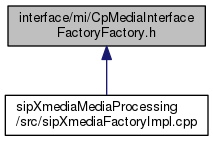Include dependency graph for CpMediaInterfaceFactoryFactory.h:

This graph shows which files directly or indirectly include this file:

Go to the source code of this file.
Functions | |
| CpMediaInterfaceFactory * | sipXmediaFactoryFactory (OsConfigDb *pConfigDb, uint32_t fameSizeMs=0, uint32_t maxSamplesPerSec=0, uint32_t defaultSamplesPerSec=0, UtlBoolean enableLocalAudio=TRUE, const UtlString &inputDeviceName="", const UtlString &outputDeviceName="") |
| Create a media interface factory factory. More... | |
| void | sipxDestroyMediaFactoryFactory () |
Function Documentation
| CpMediaInterfaceFactory* sipXmediaFactoryFactory | ( | OsConfigDb * | pConfigDb, |
| uint32_t | fameSizeMs = 0, |
||
| uint32_t | maxSamplesPerSec = 0, |
||
| uint32_t | defaultSamplesPerSec = 0, |
||
| UtlBoolean | enableLocalAudio = TRUE, |
||
| const UtlString & | inputDeviceName = "", |
||
| const UtlString & | outputDeviceName = "" |
||
| ) |
Create a media interface factory factory.
Well known function that is called to create a CpMediaInterfaceFactory object, which owns a CpMediaInterfaceFactoryImpl object, which this function also creates.
This function must be implemented for all "plug-in" static sipX media processing libraries.
- Parameters
-
[in] pConfigDb - a configuration database to pass user-settable config parameters to sipXmediaLib. [in] frameSizeMs - This parameter is used for determining the frame size (in milliseconds) that the media subsystem will use. It is used for initializing the size of audio buffers, and for configuring a default value for samples per frame in device managers (so that when devices are enabled without specifying samples per frame, the value configured here will be used). [in] maxSamplesPerSec - This is used for initializing audio buffers. Lower sample rates can indeed be used for individual media interfaces (set later), since a lesser amount of these buffers can be used (i.e. not fully utilized). Higher sample rates can be used by passing params here, but this will result in more memory being used. For low-memory environments that do not require wideband support, one may wish to pass 8000kHz here, as the default is 16000kHz. [in] defaultSamplesPerSec - The sample rate that device managers and flowgraphs will use when no sample rate is specified. [in] enableLocalAudio - Local sound card will be used if TRUE. Else all local audio capabilities will be disabled and high-res timer will be used for media processing heartbeat. [in] inputDeviceName - Name of the audio device to use as input device during a call. Use empty string to select default (OS-dependent) device. [in] outputDeviceName - Name of the audio device to use as output device during a call. Use empty string to select default (OS-dependent) device.
| void sipxDestroyMediaFactoryFactory | ( | ) |
Destroy the singleton media factory
 1.8.11
1.8.11